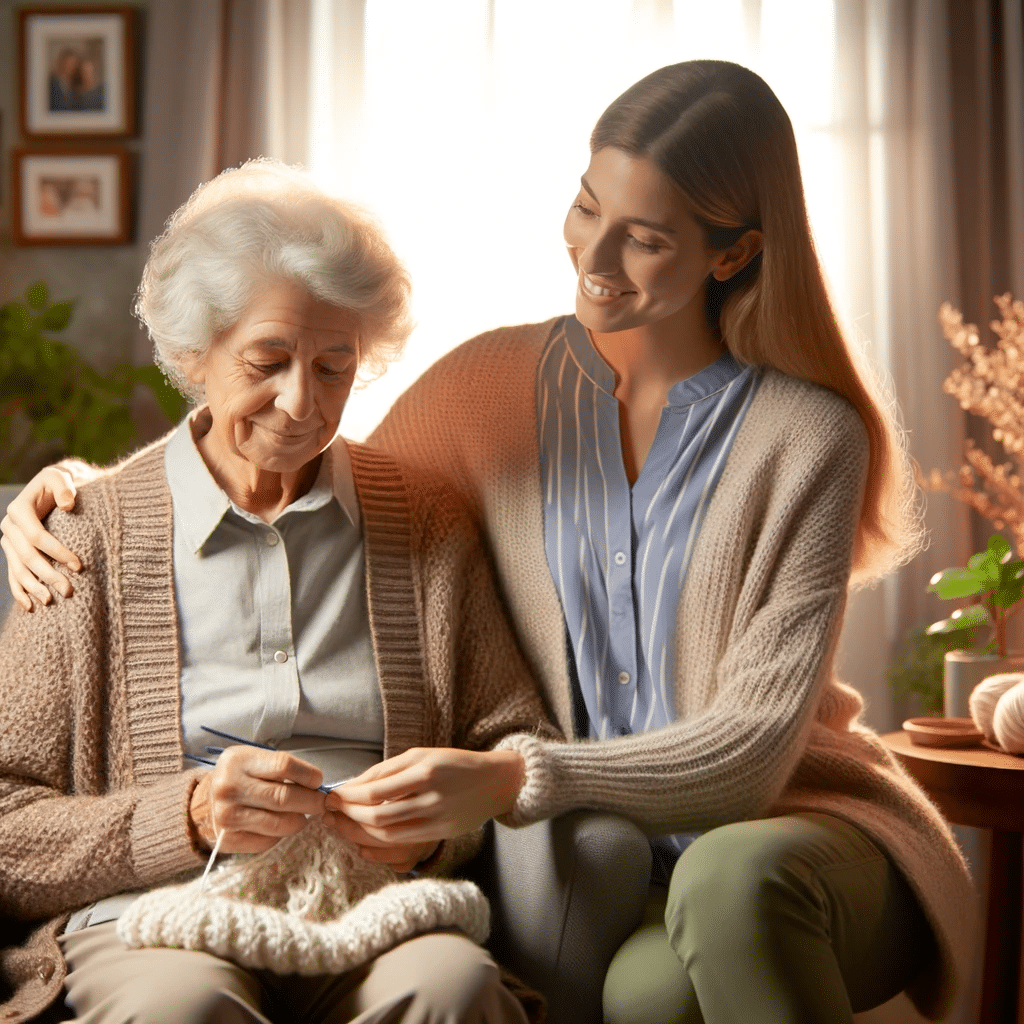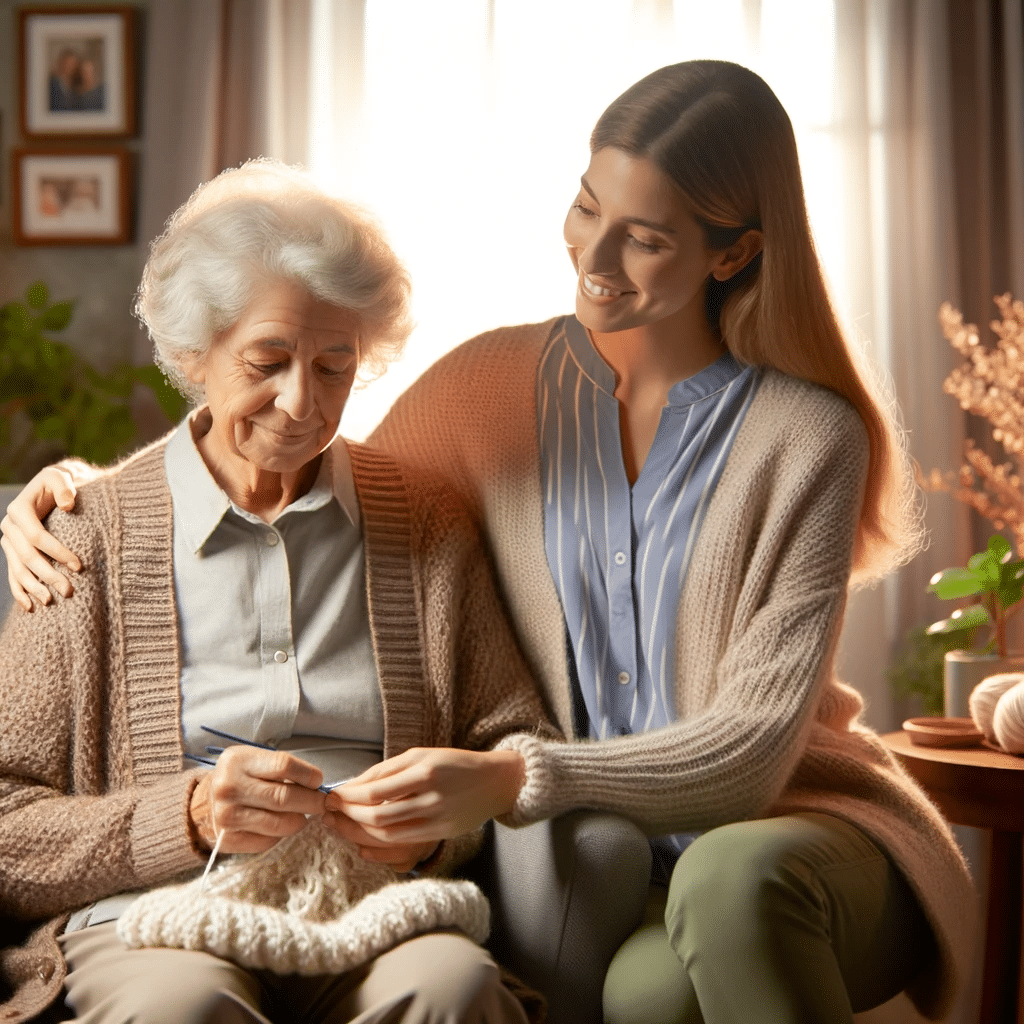Many seniors desire Aging in place, as it allows them to maintain their independence and remain in a familiar environment. However, this can be a challenge without proper support. Elderly home care services have emerged as a solution to help seniors age gracefully in the comfort of their own homes. In this guide, we will explore the various types of home care services, the role of family members, community resources, financial assistance, and tips for hiring professional caregivers to ensure the best possible care for your loved one.
Key Takeaways
Elderly home care provides tailored services enabling seniors to remain independent.
Family members can provide emotional support, companionship, and assistance with daily tasks for aging adults living at home.
Financial assistance and insurance options are available to help cover the costs of elderly home care services.
Understanding Elderly Home Care

Elderly home care enables seniors to maintain their independence by providing health, personal, and other support services while living in their homes rather than relocating to an assisted living facility or nursing home. The available services can be tailored to fit the specific needs of each individual, with options ranging from essential assistance like transportation and meal preparation to more specialized services such as Alzheimer’s care. It is necessary to carefully assess the needs and preferences of your loved one and consider factors such as location, accessibility, and available assistance before deciding on the most suitable home care option.
The upcoming sections will detail various types of elderly home care services, encompassing in-home personal care services, specialized home care services, and home health aides. Alongside these, we will discuss the vital role family members play in providing emotional support and assistance for aging adults and the invaluable resources available in local communities.
In-Home Personal Care Services
In-home personal care services are designed to assist seniors with daily living activities, such as hygiene, dressing, feeding, and mobility, enabling them to continue living in their home environment comfortably. These services include dressing, bathing, meal preparation, toileting, grooming, mobility assistance, medication reminders, and light housekeeping. However, it is essential to note that in-home personal care services do not include home modifications, such as installing grab bars or ramps.
For seniors who require additional support beyond personal care, there are other services available, such as:
Meal delivery services like Meals on Wheels
Adult day programs
Senior centers and social services
Transportation services
These programs and services aim to make life easier for seniors and provide the necessary support for them to age in place.
Specialized Home Care Services
Specialized home care services cater to seniors with specific needs, such as Alzheimer’s or post-surgical care, providing tailored support to maintain their well-being. These services may be necessary for individuals suffering from various chronic illnesses, such as stroke, diabetes, COPD, heart failure, dementia, and cancer, or for those with conditions like paraplegia, quadriplegia, Parkinson’s disease, and spinal cord injuries. Specialized care services focus on providing medically necessary care, including medication management, wound care, and physical therapy, and go beyond the scope of regular home care services, which provide nonmedical assistance and aid with everyday tasks.
For seniors with Alzheimer’s, specialized home care services like:
Home Helpers Home Care
Interim Healthcare
Visiting Angels
Cloverleaf Care
Provident Care
can provide the necessary support.
Post-surgical care services include:
Nursing care
Physical therapy
Occupational therapy
Speech-language therapy
Medical social services
These services are tailored to meet seniors’ individual needs during their recovery process.
Home Health Aides
Home health aides play a crucial role in elderly home care by providing medical assistance and monitoring for seniors, ensuring their health needs are met while aging. These professionals are not required to have formal education, such as a high school diploma, but they typically undergo training and certification programs that include classroom instruction and clinical work. Home health aides primarily focus on the health and safety of the individual they care for. In contrast, personal care assistants provide personal care and other services like cleaning, running errands, and preparing meals.
With the assistance of a home health aide, seniors can enjoy medical support while staying in their own homes. This can be particularly beneficial for those with chronic illnesses or conditions that require regular monitoring and care, allowing them to remain in the comfort of their own homes.
Family Support for Aging Adults
Family members are significant in offering emotional support, companionship, and help with daily tasks for seniors opting to age in place. Their involvement can make a substantial difference in the lives of older adults by assisting them in maintaining their independence and well-being. The forthcoming sections will detail how family members can provide emotional support and companionship for seniors living at home and how they can help with daily tasks.
From providing transportation to medical appointments to offering a listening ear and a supportive presence, family members can contribute greatly to the overall well-being of their elderly loved ones. However, it is also important to recognize the value of community resources and professional caregivers in providing additional support when needed.
Emotional Support and Companionship
Family members can help prevent loneliness and mental health issues for seniors living at home by:
Offering companionship and a supportive presence
Engaging in meaningful activities together
Attentively listening and recognizing their emotions
Providing fellowship
Assisting with daily tasks
These actions can all contribute to the emotional well-being of seniors. Regular visits and effective communication can help manage emotions such as loneliness, fear, and frustration while also addressing mental health issues and providing an opportunity for seniors to express their emotional well-being and access counseling if necessary.
Participating in activities and exercises that stimulate cognitive development, such as puzzles, board games, reading, and practicing mindfulness, can further enhance emotional well-being. By maintaining a strong emotional connection with their elderly loved ones, family members can significantly improve their quality of life and support their desire to age in place.
Assisting with Daily Tasks
Family members can contribute to elderly home care by:
Helping with chores
Assisting with meal preparation
Providing transportation
Arranging medical attention
Assisting with housework and chores
Ensuring proper cooking and nutrition
Helping with personal care and hygiene
By providing these types of support, family members can help their elderly loved ones maintain their independence and age in place.
Preparing meals suitable for elderly individuals, such as nutritious, well-balanced recipes, can contribute to their overall health and well-being. Ensuring the safety of elderly people while performing household chores is also essential, with measures such as selecting appropriate tasks, applying nonslip wax on floors, and using nonskid treads on steps to create a secure environment.
Community Resources for Elderly Home Care
Utilizing community resources can greatly support seniors’ desire to age in place. From adult day programs and senior centers to transportation services, these resources can help seniors stay engaged and connected to their community while receiving the support they need. The subsequent sections will detail various community resources that can benefit seniors and their families.
These community resources provide practical assistance and foster new friendships and social connections, enhancing the quality of life for seniors as they age.
Adult Day Programs
Adult day programs offer structured, social environments for seniors during the day, providing mental stimulation and social interaction while giving caregivers respite. These programs are particularly advantageous for elderly individuals who do not require constant supervision and can benefit from engaging in various activities in a social setting.
Research has indicated that seniors who participate in adult day programs experience an improved quality of life, as these programs address isolation through social interactions and offer psychological and behavioral advantages, particularly for those with dementia. Activities provided in adult day programs may include:
Games
Music
Cooking
Arts and crafts
Exercise
Outdoor walks
Outings
Pet therapy
Therapeutic activities such as art and singing
These activities help promote social engagement, cognitive stimulation, and physical well-being among seniors.
Senior Centers and Social Services
Local senior centers and social services provide various resources and activities to help seniors stay engaged and connected to their community. Some of the activities offered at senior centers include:
Exercise classes
Swimming
Bowling
Hiking and walking clubs
Group exercise classes
Wii sports
Gardening clubs
Book clubs
Lectures
These activities cater to a wide range of interests and abilities.
Social services play an integral role in elderly home care by offering support and assistance to seniors. Some of the ways social workers can help include:
Resolving and managing daily issues
Offering counseling and therapy to tackle psychological and emotional difficulties
Connecting seniors with resources and services that can improve their quality of life
Referring seniors to local agencies that provide specific aid and support catered to their needs
These services, provided by a geriatric care manager, are essential in ensuring the well-being and overall quality of life for elderly individuals.
Transportation Services
Community-based transportation services assist seniors in attending medical appointments and running errands, promoting independence and mobility. Seniors can reap multiple benefits from these services, such as:
Increased access to community services
Improved physical and mental health
Respite for family caregivers
Heightened sense of freedom and independence
The cost of community-based transportation services for seniors can vary, with options ranging from volunteer driver programs charging a nominal fee to private services that may be more expensive. Regardless of the cost, these services prioritize the safety of seniors, implementing background checks on drivers, regular vehicle maintenance, driver training, safety protocols, and communication systems.
Financial Assistance and Insurance Options
Ensuring the affordability of elderly home care is a significant concern for many families. Financial assistance options such as:
Medicaid
Medicare
Long-term care insurance
State and federal programs
It can help cover the costs of elderly home care, making aging in place more accessible for seniors. The forthcoming sections will detail these financial assistance and insurance options extensively.
Comprehending the array of financial assistance options available can aid families in making educated decisions, ensuring their loved ones receive the required care without financial pressure.
Medicaid and Medicare
Medicaid and Medicare are government programs providing financial assistance for eligible seniors to receive in-home care services and support their desire to age. Medicaid is a federally and state-funded health insurance program for low-income individuals and families. At the same time, Medicare is a federal health insurance program for people aged 65 and above, specifically younger people with disabilities.
Medicare coverage for in-home care services is restricted to certain skilled services, such as skilled nursing, therapy, and care provided by a home health aide. At the same time, Medicaid can cover the costs of home health care services for eligible recipients, as individual states administer it and have more leeway in protecting home care services. Seniors may contact their state Medicaid agency or utilize the Health Insurance Marketplace to apply for Medicaid or Medicare.
Long-Term Care Insurance
Long-term care insurance is a type of insurance policy that assists in covering the expenses associated with long-term care services, such as home health care, assisted living, and nursing home care. Long-term care insurance provides home care services for seniors and those with long-term care needs, covering the cost of professional nursing care, occupational therapy, rehabilitation, and other services necessary for elderly home care.
When considering long-term care insurance, it is essential to understand the coverage provided and the advantages of the policy. The coverage may necessitate a waiting period before payments commence or a predetermined number of days of home care services before coverage takes effect.
State and Federal Programs
Various state and federal programs offer financial assistance and support for seniors seeking home care services, making aging in place more accessible. These programs include:
Programs for Older Adults administered by the Administration on Community Living
State-based Medicaid programs
Various programs in states such as California and Illinois
The eligibility criteria for state and federal assistance for home care for seniors may vary depending on the specific program. Still, some standard criteria include being 60 or older, having a low income, and fulfilling specific medical or functional needs. It is recommended to consult with the particular program or agency for thorough eligibility requirements.
Hiring Professional Caregivers: Tips and Considerations
Identifying the ideal professional caregiver for your loved one requires thoughtful consideration. This section offers guidance on:
Choosing between home care agencies and independent providers
Appraising caregiver qualifications
Devising a care plan to guarantee the optimal care for your loved one
Adhering to these tips and considerations can aid you in making an educated choice and picking a caregiver who is adequately equipped to offer the required care and support for your loved one.
Choosing Between Home Care Agencies and Independent Providers
When weighing options between home care agencies and independent providers, it’s essential to balance the pros and cons of each choice. Home care agencies are licensed businesses that employ a team of caregivers and contract with families to provide caregivers for their homes. At the same time, independent providers render home care services without agency support.
Independent providers often charge less than home care agencies, making them more affordable for families, and they tend to offer more flexibility in terms of scheduling and services provided. However, families employing independent providers assume the responsibilities of being an employer, including managing payroll, taxes, and insurance. They may not have the same level of oversight and supervision as caregivers from home care agencies.
Consider your specific needs and preferences when making a decision.
Evaluating Caregiver Qualifications and Experience
Evaluating potential caregivers’ qualifications, experience, and references is vital to ensure they are adequately prepared to care for your loved one. Consider factors such as:
Work history
References
Certifications and training
Skill assessment
Background checks
when evaluating the experience of a potential caregiver.
By thoroughly evaluating caregiver qualifications and experience, you can select a caregiver with the necessary skills, knowledge, and understanding to provide quality care for your elderly loved one.
Setting Expectations and Creating a Care Plan
Working in tandem with your chosen caregiver to set clear expectations and formulate a comprehensive care plan tailored to your loved one’s needs and preferences is crucial. A comprehensive care plan should encompass:
Personal information
Health conditions
Medications
Care preferences
Caregivers
Resources
Health assessments
Goals and objectives
Contingency plans
- Daily Schedule
Working closely with your caregiver, you can create a care plan that addresses your loved one’s needs while providing the necessary support and assistance for a comfortable, independent life at home.
Summary
In conclusion, elderly home care services, family support, community resources, and financial assistance options all play a significant role in helping seniors age in place. By understanding the various types of home care services, utilizing community resources, and carefully selecting a professional caregiver, you can ensure that your loved one receives the best possible care in their home. The journey to aging in place may be challenging, but seniors can continue leading fulfilling and independent lives with the proper support and resources.
Frequently Asked Questions
What is it called when you help the elderly at home?
A home health aide or elder care caregiver helps the elderly remain independent by providing nonmedical assistance in their own home.
When should you give up caregiving?
When physical exhaustion, declining health, feeling overwhelmed, and a significant decline in personal well-being are present, it may be time to reevaluate the caregiving role. Additionally, suppose avoidance of the loved one, anger, fatigue, depression, impaired sleep, poor health, irritability, or hopelessness are evident. In that case, taking a break and seeking support for caregiving responsibilities is advisable.
How do you find a live-in caregiver for the elderly?
Finding a live-in caregiver for elderly people can be accomplished through traditional advertising, such as newspaper and magazine ads, billboards, radio spots, and direct mailings. Advertising in senior directories and sponsoring signs or ads at local businesses are also great options.
What types of elderly home care services are available?
Elderly home care services include in-home personal care, specialized care, and home health aides, providing comprehensive support for aging individuals.
How do I choose between home care agencies and independent providers for elderly care?
When choosing between home care agencies and independent providers for elderly care, consider cost, screening processes, and flexibility.

